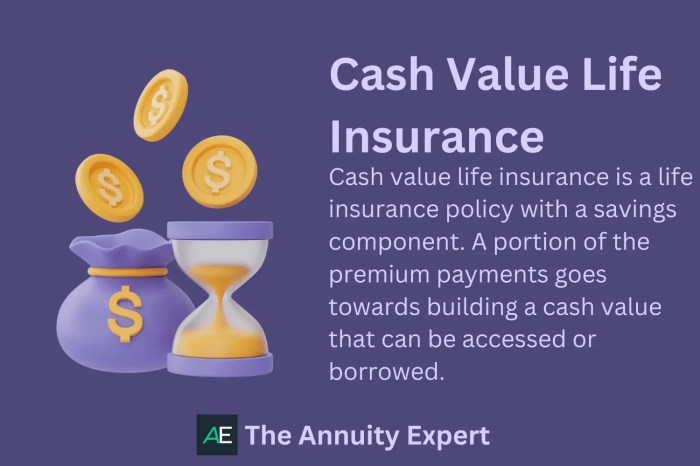Life insurance with cash value opens up a world of financial opportunities and security. Dive into this comprehensive guide to understand how you can make the most of this unique insurance policy.
Explore the different types of policies, ways to build cash value, and strategies to access it when needed. Get ready to take control of your financial future with life insurance that goes beyond just protection.
Overview of Life Insurance with Cash Value

Life insurance with cash value is a type of life insurance policy that not only provides a death benefit to beneficiaries upon the policyholder’s death but also accumulates a cash value over time. This cash value grows tax-deferred and can be accessed by the policyholder during their lifetime through withdrawals or loans.
Differences from Other Types of Life Insurance
Life insurance with cash value differs from term life insurance, which only provides a death benefit and does not accumulate cash value. Whole life and universal life insurance are two common types of life insurance that include a cash value component, but they have different features and flexibility compared to life insurance with cash value.
- Whole life insurance offers fixed premiums, a guaranteed death benefit, and a guaranteed cash value growth rate.
- Universal life insurance provides more flexibility in premium payments and death benefit amounts, but the cash value growth is tied to interest rates and market performance.
The cash value in life insurance can serve as a savings component, emergency fund, or supplemental retirement income, providing financial security and peace of mind.
Benefits of Life Insurance with Cash Value
Having a life insurance policy with cash value offers several benefits, including:
- Financial Security: The cash value can be used for emergencies, debt repayment, or other financial needs, providing a safety net for the policyholder and their family.
- Asset Growth: The cash value has the potential to grow over time, offering a source of long-term savings and investment.
- Tax Advantages: The cash value grows tax-deferred, meaning policyholders do not pay taxes on the growth until they make withdrawals or surrender the policy.
Importance of Cash Value in Life Insurance
Cash value in life insurance plays a crucial role in financial planning and security by:
- Providing Liquidity: Policyholders can access the cash value through withdrawals or loans, offering flexibility and liquidity for unexpected expenses or opportunities.
- Building Wealth: The cash value can supplement retirement savings or be used for major expenses like college tuition or purchasing a home, enhancing overall financial well-being.
- Legacy Planning: The cash value can be passed on to beneficiaries along with the death benefit, creating a lasting legacy for future generations.
Types of Life Insurance Policies with Cash Value

Life insurance policies with cash value are a popular choice for individuals looking for both protection and investment opportunities. Two common types of life insurance policies that offer cash value are whole life insurance and universal life insurance. Let’s compare and contrast these two types in terms of cash value accumulation.
Whole Life Insurance vs. Universal Life Insurance
Whole Life Insurance:
– Provides a guaranteed death benefit and cash value accumulation.
– Premiums are typically higher compared to universal life insurance.
– Cash value grows at a fixed rate determined by the insurance company.
– Policyholders can access the cash value through loans or withdrawals.
Universal Life Insurance:
– Offers more flexibility in premium payments and death benefits.
– Cash value accumulation is tied to market performance through investment options.
– Policyholders can adjust the death benefit and premium payments.
– Cash value growth is not guaranteed and can vary based on market conditions.
Examples of How Cash Value Can Be Utilized:
– Policy Loans: Borrow against the cash value of the policy.
– Premium Payments: Use the cash value to cover premium costs.
– Supplement Retirement Income: Withdraw cash value to supplement retirement income.
– Emergency Fund: Tap into the cash value in case of emergencies.
Impact on Premiums and Death Benefits:
– In whole life insurance, the cash value component helps offset the cost of insurance, leading to level premiums throughout the policy’s lifetime.
– In universal life insurance, cash value fluctuations can impact premium payments and death benefits, depending on the policy’s performance.
Understanding the differences between whole life insurance and universal life insurance in terms of cash value accumulation can help individuals make informed decisions when selecting a life insurance policy that aligns with their financial goals and needs.
Building Cash Value in Life Insurance

Building cash value in a life insurance policy is crucial for policyholders looking to maximize the benefits of their coverage. There are various ways in which cash value can grow within a life insurance policy, including the role of premiums, interest, dividends, and investment options.
Role of Premiums in Building Cash Value
Premiums play a key role in building cash value in a life insurance policy. The amount of premium paid directly impacts the growth of cash value over time. Higher premiums typically lead to faster accumulation of cash value, while lower premiums may result in slower growth.
Role of Interest in Building Cash Value
Interest is another factor that contributes to the growth of cash value in a life insurance policy. The cash value component of a permanent life insurance policy earns interest over time, helping to increase the overall value of the policy.
Role of Dividends in Building Cash Value
Some permanent life insurance policies offer the potential to earn dividends, which can further enhance the cash value accumulation. Dividends are typically paid out by mutual insurance companies to policyholders based on the company’s financial performance.
Role of Investment Options in Building Cash Value
Certain types of life insurance policies, such as universal life insurance, offer investment options that allow policyholders to allocate their cash value into various investment vehicles. By selecting the right investment options, policyholders can potentially increase the growth of their cash value.
Tips to Maximize Cash Value Accumulation
- Consider paying higher premiums to accelerate cash value growth.
- Regularly review and adjust your policy to take advantage of interest and dividend opportunities.
- Explore investment options within your policy to potentially boost cash value accumulation.
- Consult with a financial advisor to develop a strategy that aligns with your financial goals.
Accessing Cash Value in Life Insurance: Life Insurance With Cash Value
Life insurance policies with cash value offer policyholders the flexibility to access funds that have accumulated over time. There are several methods available for policyholders to access the cash value in their life insurance policy, each with its own implications and considerations.
Withdrawing Cash Value
Withdrawing cash value from a life insurance policy involves taking out a portion of the accumulated funds. Policyholders can typically request a withdrawal directly from the insurance company, which will reduce the death benefit and may be subject to surrender charges or tax implications.
- Withdrawals may be subject to surrender charges if taken within a certain period after the policy is initiated.
- Policyholders should consider the impact of reducing the death benefit on their beneficiaries.
- Withdrawals are usually tax-free up to the amount of premiums paid, with any additional funds considered taxable income.
Taking Out Loans, Life insurance with cash value
Policyholders can also access cash value by taking out a loan against the policy. Loans are typically tax-free and do not require repayment, as the outstanding balance is deducted from the death benefit upon the policyholder’s passing.
- Interest rates on policy loans are usually lower than traditional loans, making them a cost-effective borrowing option.
- Unpaid loans can reduce the death benefit or lead to policy lapse if not managed properly.
- Policyholders should be aware of any loan interest accruing on the outstanding balance.
Surrendering the Policy
Surrendering a life insurance policy involves terminating the coverage in exchange for the cash value. Policyholders receive the accumulated funds minus any surrender charges or outstanding loans, but forfeit the death benefit associated with the policy.
- Surrender charges may apply if the policy is terminated before a certain period, reducing the cash value received.
- Policyholders should consider alternative options before surrendering the policy to avoid losing coverage and potential benefits.
- Surrendering a policy may trigger tax consequences, especially if the cash value exceeds the premiums paid.
Accessing cash value in a life insurance policy can be beneficial for policyholders in need of financial flexibility or facing unexpected expenses. However, it is essential to carefully consider the implications of withdrawing cash value, taking out loans, or surrendering the policy to make informed decisions that align with long-term financial goals and protection needs.
In conclusion, life insurance with cash value is not just a policy but a valuable asset that can secure your financial well-being. By understanding its intricacies and maximizing its benefits, you can truly take charge of your future.
Looking for cheap life insurance quotes can be overwhelming with so many options available. It’s important to compare different policies to find the best coverage that fits your budget and needs. Understanding the different types of life insurance coverage available can help you make an informed decision. Utilizing a life insurance calculator can also be beneficial in determining how much coverage you may need based on your financial situation.
Looking for cheap life insurance quotes to protect your loved ones? It’s essential to find a policy that fits your budget while providing adequate coverage.
Understanding different types of life insurance coverage can help you make an informed decision. From term life to whole life policies, there are options to suit every need.
Using a life insurance calculator can help you estimate how much coverage you need based on your financial situation and future goals. Stay prepared for the unexpected.



